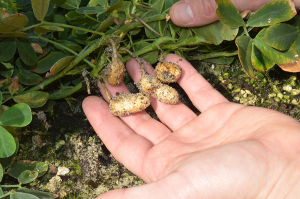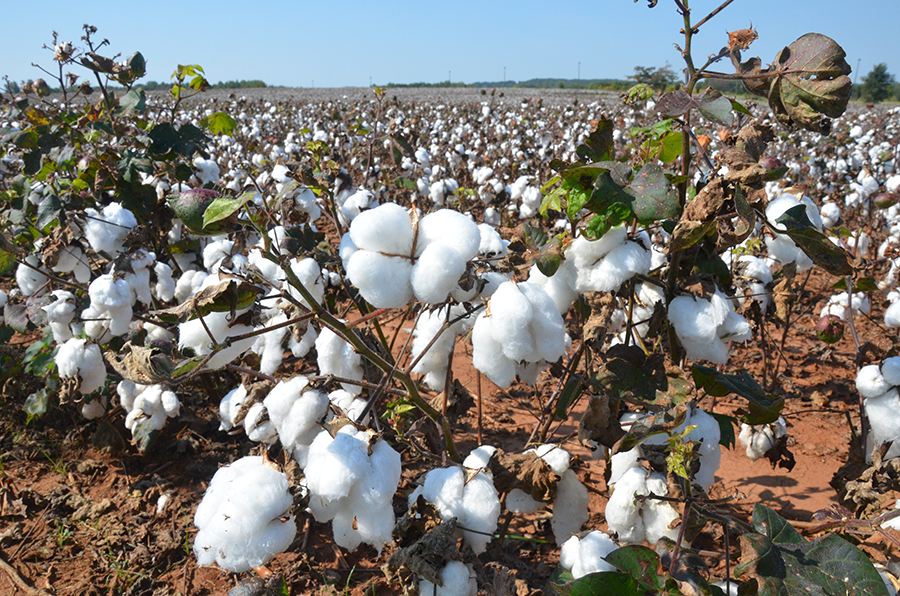
 Modern agriculture and forestry produces the food, fiber and fuel that sustain our lives. Agriculture is currently facing many serious challenges from increasing scarcity of resources, yet as consumers, we expect production to continue to keep pace with an increasing human population. At HudsonAlpha Institute for Biotechnology, we are addressing these agricultural challenges through the HudsonAlpha Center for Plant Science and Sustainable Agriculture. Our investigators and their lab members – some of whom were part of completing sequencing for the first human genome – are applying the techniques of genomic research to plants and agriculture. Recently, advanced technologies have given us both access to complex plant genomes and the ability to examine genetic differences across thousands of plant varieties. In addition, high-performance computing allows us to analyze and integrate these enormous amounts of data. With these new tools and our extensive experience in plant genomics, HudsonAlpha researchers are in a unique position to accelerate discoveries in crops and develop new scientific methods that will change the way we grow and use plants in agriculture.
Modern agriculture and forestry produces the food, fiber and fuel that sustain our lives. Agriculture is currently facing many serious challenges from increasing scarcity of resources, yet as consumers, we expect production to continue to keep pace with an increasing human population. At HudsonAlpha Institute for Biotechnology, we are addressing these agricultural challenges through the HudsonAlpha Center for Plant Science and Sustainable Agriculture. Our investigators and their lab members – some of whom were part of completing sequencing for the first human genome – are applying the techniques of genomic research to plants and agriculture. Recently, advanced technologies have given us both access to complex plant genomes and the ability to examine genetic differences across thousands of plant varieties. In addition, high-performance computing allows us to analyze and integrate these enormous amounts of data. With these new tools and our extensive experience in plant genomics, HudsonAlpha researchers are in a unique position to accelerate discoveries in crops and develop new scientific methods that will change the way we grow and use plants in agriculture.

Key challenges to modern agricultural systems:
- Sustainability: water, nutrient and pesticide use
- Widespread plant pests due to changes in climate
- Dependence on limited number of crop plants for human use

Plant genomic solutions to these key challenges:
- Understanding the key biological processes in how plant use and recycle resources
- Mining natural genetic variations for drought tolerance from wild relatives to common agricultural crops
- Understanding plant disease immunity and the plant response to attack from pests to select for resistant varieties
- Incorporation and improvement of perennial crops into farming and using our knowledge of genes and traits to accelerate breeding of new crop varieties
Research Focus Areas for HudsonAlpha Center for Plant Science and Sustainable Agriculture
Understanding the function of plant genes
One of the key issues facing plant genomic science is that we still do not know the biological function of many plant genes. At HudsonAlpha’s Center for Plant Science and Sustainable Agriculture., we are developing tools that will help us understand the as yet unknown roles of the genes that are important for sustainable agricultural practices.
Using genomic sequencing to link plant genes and plant features
A key goal for identifying useful traits in plants used for agriculture is the development of techniques to measure specific plant features (tiller count, leaf area, water use efficiency or photosynthesis activity, for example). These measurement tools are crucial because they allow plant researchers to make links between genetic differences among plants and the traits those difference cause. HudsonAlpha investigators are implementing and improving low cost tools that can be applied across a broad range of crop plants. Ultimately, our goal in this research is to identify which genes could be targets for crop improvement.
Analyzing and comparing plant genomic data
Computational plant genomics is the process of understanding how genomic information intersects with plant biological processes. HudsonAlpha scientists use high performance supercomputers to analyze and compare genomic sequences with data about the actual function of plant genes and traits. This analysis will help us understand how plants interact with their environments.
Plant improvement
In recent years, rapid advances have been made in the field of precision genome editing and plant biotechnology. These tools allow plant researchers to change a specific base in a gene or replace a gene with a better functioning one. For example, a gene that makes a wild relative of switchgrass more drought tolerant could be edited in a switchgrass genome to make the switchgrass plant produce more yield with less water without changing the rest of the genome. By combining the knowledge generated from our other research focus areas, the Center can identify key genes related to important crop traits. Rather than waiting multiple years to traditionally breed these genetic variations obtained from wild, better adapted varieties into high yielding modern crops, we can quickly test our predictions or create new crop lines by using these exciting new plant engineering tools.
Crop improvement
Because many crops that are grown in Alabama were not originally bred for the Alabama climate and soil, they do not flourish as well as they do elsewhere in the country. The goal of the Center’s new project is to use the power of genomics and plant breeding to introduce new, improved agricultural crops in Alabama.
For example, faculty investigators, Jane Grimwood, PhD, and Jeremy Schmutz previously generated the first reference sequence for the common bean and contributed to early work in barley. Researchers at HudsonAlpha, along with several expert collaborators, will plant diverse bean and barley germplasm at several field stations throughout the state, and monitor their growth throughout the growing season to pick plants that grow the biggest, are resistant to disease, or other important agricultural characteristics. Leaning on their genomic expertise and the reference genome, HudsonAlpha faculty will read the DNA and analyze relationships between genetic variation and phenotypic traits to select lines for improved breeding of new crops for Alabama. Knowing which genes control specific traits allows researchers to select for plants that will thrive in Alabama.
While the group is focusing on improving crops to thrive in Alabama, the pipeline that is developed and improved during this initial project will be applicable to plants in other geographical locations. The Center will continue to leverage their growing genomics expertise with the ever-improving sequencing technology to deploy genomics into plant breeding and help to accelerate plant breeding programs to develop the next generation of crops.
Members of the Center:
Jane Grimwood
Genomic Data Collection and Technology
Jeremy Schmutz
Computational Analysis & Discovery from Genomic Data
Kankshita Swaminathan
Functional Genomics & Gene Editing
Josh Clevenger
Crop Trait Discovery & Genomic Enable Breeding
Alex Harkess
Biodiversity, Ecology & Evolutionary Genomics
To learn more about agriscience click here to view the 2019-2020 Research Report.
